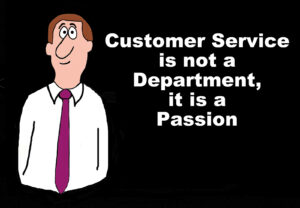How Focusing on Customer Experience Can Drive Employee Engagement
I was completely delighted by an automated email response I recently received after placing an order for deodorant.
Yes, a simple ten-dollar purchase for an everyday product resulted in me telling thousands of people about my experience with this company!
Why?
Because their email autoresponder was SO funny! The personalized email, with the subject line reading “Michael You Rock,” described in length how excited the entire office was because of my $10.00 online purchase.
Clearly, this business understands that exceeding customers’ expectations isn’t just about those moments when you interact directly with your customers, it’s about the entire customer experience.
Focusing on customer experience, however, isn’t just about wowing your customers. If you want to engage a greater number of employees in a more meaningful way, while also delivering on your promise to be a “service-first” business, then don’t just talk about the importance of customer service in your business.
Of course, exceptional customer service is critical, but focusing only on customer service misses the bigger picture.
But before I delve into that, what exactly is the difference between customer service and customer experience?
Customer service is a subset of customer experience.
Customer service covers all those critical customer touch points when your employees are interacting directly with your customers, whether it’s in person, on the phone, or exchanging email or text messages.
And of course, you want to champion exceptional customer service. Which, incidentally, means you need to tell all your employees to STOP providing good customer service.
I’m serious! Put up a giant sign or banner in your back office that reads:
STOP Providing Good Customer Service!
Okay, so I’m being slightly cheeky here. But here’s why you need to stop providing good customer service:
Your customers already expect good customer service!
So, if that’s the case, then all you are doing by providing good customer service is meeting expectations. And no one is going to rave to their friends and colleagues about your business if all you are doing is meeting expectations!
You won’t build your brand as a service superstar and you’ll even have a more challenging time attracting and engaging great employees if all you are doing is meeting expectations.
Which is why you need to challenge your service employees to either do something different to be more memorable or doing something, no matter how small, to consistently exceed your customers’ expectations.
And you need to focus on the entire experience your customers have when they engage with you, which brings us back around to why customer experience is so critically important.
The customer experience includes all your customer service touch points, but it’s much broader than that.
Customer experience captures ever single aspect of your customers’ journey with you, including how easily they can find you online and navigate your website, how clean your parking lot is, and how easy it is just to find you!
Customer experience is about how easy it is to pay an invoice, open a product package, read the instructions on a product, return a product, or ask follow-up questions.
There are two reasons why you need to consider the entire customer experience.
First, it impacts how a client views their interaction with you!
Your customer may have had the most wonderful customer service interaction with your sales rep, but if their experience trying to pay for your product, understand the instructions, or return a product was a nightmare, then it’s going to leave a bitter taste in their mouth.
That’s why you need to look at every step of the customer journey to make sure their entire trip with you exceeds their expectations.
The second reason to focus on customer experience is that it’s THE most effective way to engage all your employees with a greater sense of purpose in their jobs.
When you only talk about the importance of customer service, it can be easy for employees who have no direct contact with your customers to feel as though the message doesn’t pertain to them.
So, you need to intentionally connect every role in your organization to your customers’ experience and explain why their job matters. Everyone needs to be seen as a valuable member of your customer experience support team.
Some companies, for example, take their manufacturing employees to see their finished products being used by their customers so they experience firsthand why their contribution matters.
And now that you understand why customer experience matters, I encourage you to take some time this week to draw a service touch point road map that summarizes every point of contact with your customers. Then, commit to connecting every employee to your customer experience goals.
If you do that, you’ll be well on your way to creating a service-first culture.
 Michael Kerr is a Hall of Fame Speaker who speaks about inspiring workplace cultures, inspiring customer service, leadership and businesses that put humor to work for less stress and more success. He is the author of 8 books, including, The Humor Advantage, The Jerk-Free Workplace, and Hire, Inspire, and Fuel Their Fire. To find out how Michael can energize your workplace, send an email to mike@mikekerr.com
Michael Kerr is a Hall of Fame Speaker who speaks about inspiring workplace cultures, inspiring customer service, leadership and businesses that put humor to work for less stress and more success. He is the author of 8 books, including, The Humor Advantage, The Jerk-Free Workplace, and Hire, Inspire, and Fuel Their Fire. To find out how Michael can energize your workplace, send an email to mike@mikekerr.com






